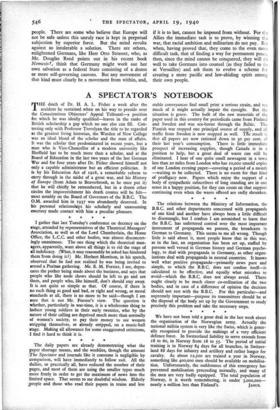A SPECTATOR'S NOTEBOOK
THE death of Dr. H. A. L. Fisher a week after the accident he sustained when on his way to preside over the Conscientious Objectors' Appeal Tribunal—a position for which he was ideally qualified—leaves in the ranks of British scholarship a gap which no one else can fill. Con- testing only with Professor Trevelyan the title to be regarded as the greatest living historian, the Warden of New College was an ideal blend of the scholar and the man of affairs. It was the scholar that predominated in recent years, but a man who is Vice-Chancellor of a modem university like Sheffield has to be much more than a scholar, and at the Board of Education in the last two years of the last German War and for four years after Dr. Fisher showed himself not only a capable administrator but an efficient politician. It is by his Education Act of 1918, a remarkable reform to carry through in the midst of a great war, and his History of Europe (from Adam to Beaverbrook, as he once put it) that he will chiefly be remembered, but in a dozen other circles the impoverishment his death creates will be felt— most notably on the Board of Governors of the B.B.C. The OM. awarded him in 1937 was abundantly deserved. In his personal relationships his scholarly and unassuming courtesy made contact with him a peculiar pleasure.
* *










































 Previous page
Previous page